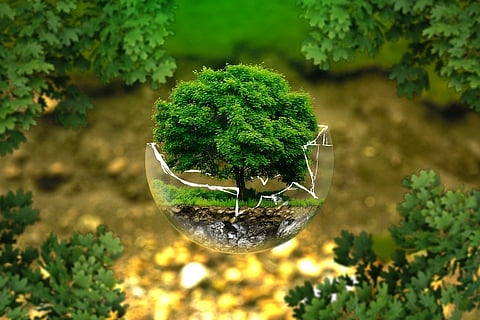For Sustainable Development, A Radical Shift Required In The Way We See And Treat Nature
Agra, December 1 (TNA) A paradigm shift in perceptions and treatment of nature was the need of the hour to save our planet from all kinds of dreaded pollutions. This was the consensus of global webinar on sustainable development and management of life support ecosystems, organised by Agra based green organisation SPHEEHA (society for preservation of the healthy environment, ecology and heritage of Agra).
Giving details of the webinar, a SPHEEHA spokesperson Shabd Mishra said “this webinar was organised a few days back but the writing of reports and reviewing the papers took some time. The final report is being released Monday evening, for wider circulation as the findings are of critical importance for all stakeholders.”
According to economist Nitin Desai, “We see nature as something to be extracted and exploited, instead of seeing ourselves as part of it.” Desai said that since the environment does not respect political boundaries, cooperation is required across jurisdictions – at global, regional, and local levels – if all the 17 sustainable development goals of the United Nations have to be achieved.
The goals include good health and wellbeing; clean water and sanitation; affordable and clean energy; reduced inequalities; responsible consumption and production; climate action and protecting life below water and on land.
Desai said these goals can be achieved only through integrated development and global cooperation. He said the situation has become so precarious that 50 years from hence, some urban areas in India and Pakistan will be the first to experience a lethal heatwave.
In India, Mumbai and the Gangetic delta will witness frequent flooding affecting life support systems. “we are already consuming 60 percent more of what nature can produce,” he said. He also said that “the imbalance in nature has led to closer interaction between humans and wildlife, leading to spread of pandemic-zoonotic diseases like the Covid-19 virus.”
Speaking of pandemics, Sunil Bagaria, head of US-based global recycling and sustainability company called GDB International said the world has been battling another pandemic called plastic waste for a long time now.
“If only the stakeholders show the same urgency shown in battling coronavirus in addressing the plastic menace, we would have had a healthier planet,” he said. At present investment in creating plastic is more than investment in recycling capacities. Bagaria added that only 9 percent of all plastic produced are recycled and 12 percent is incinerated, while 79 percent of plastic waste end up in landfills, sewers, streets, rivers, and oceans.
While companies are doing their bit in reducing plastic waste, he said the individual commitment to cut plastic will be a force multiplier. On our part, we can cut single-use plastic, carry our own water bottles and cotton shopping bags, and actively take part in clean-up operations.
Speaking of SPHEEHA’s role in making Agra a plastic-free model city, Bagaria said the society can: Educate children about the benefits of recycling plastic and the need to stop littering, Bring the stakeholders together on a common platform, Encourage households to segregate waste, Create entrepreneurs out of ragpickers and Use advanced recycling technologies.
Former power secretary Anil Razdan called for energy efficiency for cleaner and greener development. He said, “Our energy needs are huge but our consumption levels are abysmal. We need to increase availability and consumption with a strong emphasis on efficiency,” He said mere growth is not enough. It has to be faster, more inclusive, and sustainable growth.
While the above-mentioned steps can be taken at the microcosmic level, consciousness shift at the macrocosmic level can help improve the quality of flora and fauna leading to a healthy planet. Tapping on the spiritual wisdom given to us is the best solution.
Addressing the webinar, the spiritual head of the Radhasoami Faith (Dayalbagh) Prof Prem Saran Satsangi said, “Nature is unordered, meaning that nature possesses infinite varieties and unless we rise to the occasion of having more than infinite varieties, nature cannot be rendered to serve the cause of the entire creation. All our religious traditions ranging from the Bhagavad Gita to the various religions of the world have suggested finding a solution to green conservation within the framework of spirituality. We need to build a land which takes care of the healthcare of its inhabitants.”

